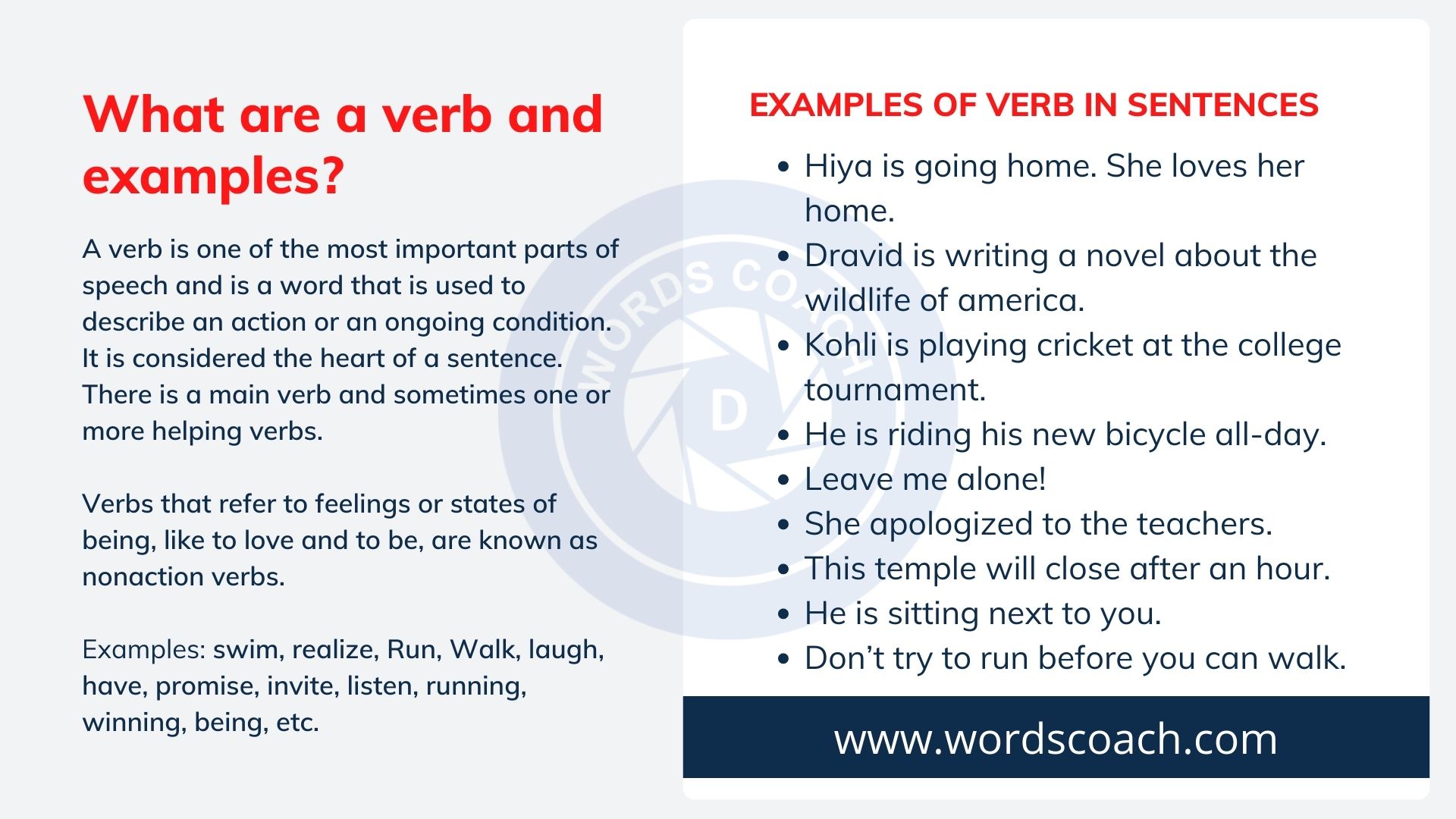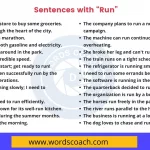Examples of Verb in Sentences
What is a verb, and examples?
A verb is one of the most important parts of speech and is a word that is used to describe an action or an ongoing condition. It is considered the heart of a sentence. There is a main verb and sometimes one or more helping verbs.
Verbs that refer to feelings or states of being, like to love and to be, are known as nonaction verbs.
The verbs that do refer to literal actions are known as action verbs.
Examples: swim, realize, Run, Walk, laugh, have, promise, invite, listen, running, winning, being, etc.
- An action (e.g., run, eat, write)
- A state of being (e.g., is, seem, become)
- An occurrence (e.g., happen, occur, develop)
Types of Verbs with Examples
Action Verbs
Action verbs express physical or mental actions.
Examples in Sentences:
- She runs every morning. (Physical action)
- He thinks deeply about the problem. (Mental action)
- The chef cooked a delicious meal.
- They laughed at the joke.
- The dog jumped over the fence.
Read more: Action Verbs List, definition, and Example Sentences
Linking Verbs
Linking verbs connect the subject to additional information (subject complement) rather than showing action. Common linking verbs include be, seem, appear, become, feel, look, sound, taste, remain.
Examples in Sentences:
- She is a doctor.
- The cake tastes delicious.
- He seems tired after work.
- The flowers smell wonderful.
- They became friends quickly.
Read more: Linking Verbs
Helping (Auxiliary) Verbs
Helping verbs work with the main verb to express tense, mood, or voice. Common helping verbs include be, have, do, can, may, must, shall, will, could, might, should, would.
Examples in Sentences:
- She is going to the market. (Present continuous tense)
- They have finished their homework. (Present perfect tense)
- He can swim very well. (Ability)
- You must complete the assignment. (Obligation)
- We will visit Paris next year. (Future tense)
Read More: Helping Verbs: Meaning, Types, and Examples
Modal Verbs
Modal verbs express necessity, ability, permission, or possibility. Examples include can, could, may, might, must, shall, should, will, would.
Examples in Sentences:
- You should drink more water. (Advice)
- She can speak three languages. (Ability)
- May I borrow your pen? (Permission)
- It might rain tomorrow. (Possibility)
- He must submit the report today. (Necessity)
Read More: English Modal Verbs
Transitive and Intransitive Verbs
- Transitive verbs require a direct object.
- Intransitive verbs do not require an object.
Examples in Sentences:
Transitive:
- She bought a new dress. (Object: dress)
- He kicked the ball. (Object: ball)
Intransitive:
- The baby cried loudly. (No object needed)
- They arrived early. (No object needed)
Read more: Intransitive Verbs: Meaning, Types, and Examples
Regular and Irregular Verbs
- Regular verbs form their past tense by adding *-ed*.
- Irregular verbs have unique past forms.
Examples in Sentences:
Regular:
- She walked to school. (Past of “walk”)
- They played football yesterday. (Past of “play”)
Irregular:
- He ate an apple. (Past of “eat”)
- She wrote a letter. (Past of “write”)
Read more: Irregular Verbs: Meaning, Types, and Examples

Examples of a Verb in Sentences
1. Hiya is going home. She loves her home.
2. Dravid is writing a novel about the wildlife of america.
3. Kohli is playing cricket at the college tournament.
4. He is riding his new bicycle all-day.
5. Leave me alone!
6. She apologized to the teachers.
7. This temple will close after an hour.
8. He is sitting next to you.
9. Don’t try to run before you can walk.
10. That Aeroplane was flying above the clouds.
11. It may rain today.
12. America is a developed nation.
13. It could get very hot in Montana.
14. She is smiling in front of the audience.
15. You are coming right now at the seminar.
16. The police are asking about the incident that happened last night.
17. It might rain today.
18. We are knowing each other.
19. Everyone likes to watch a magic show.
20. We are participating in the cultural program.

Common Verb Mistakes to Avoid
- Subject-Verb Agreement Errors
- ❌ She go to school.
- ✅ She goes to school.
- Incorrect Verb Tense
- ❌ Yesterday, he eat pizza.
- ✅ Yesterday, he ate pizza.
- Missing Helping Verbs
- ❌ She running fast.
- ✅ She is running fast.
Want to Learn More?
| Synonyms and Antonyms Exercise | C2 Vocabulary Exercise | B1 Vocabulary Exercises |
| English Modal Verbs | Parts of Speech | Common English Irregular Verb List |






Very good
very good